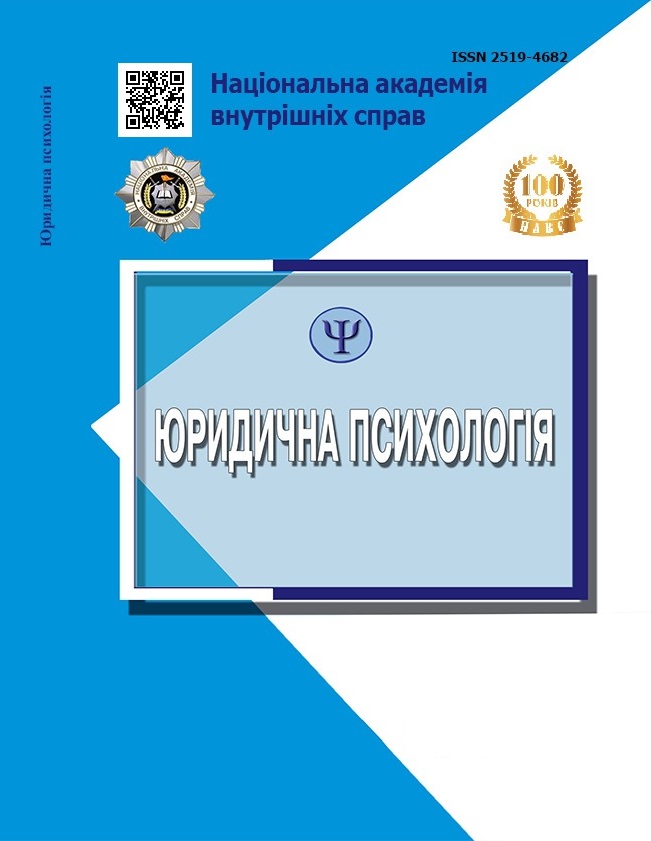Card of Professionally Important Skills for Police Divisions of Preventive Communication
Abstract
Scientific sources describe many professionally important skills of the negotiator. However, research does not fully disclose the content of groups of professionally important skills that are needed for police divisions (groups) of preventive communication. Methodology – general scientific methods, author’s questionnaire, mathematical methods were used during the research. The purpose of the research is to develop a Card of professionally important skills for police divisions (groups) of preventive communication. To achieve this moment, the following tasks were solved: 1) to establish a list of professionally important skills that police officers (groups) of preventive communication lack; 2) substantiate and develop a Card of professionally important skills of police divisions (groups) of preventive communication, which is necessary for the effective implementation of negotiation activities. The scientific novelty of the article is that the author for the first time developed a Card of groups of professionally important skills that should be inherent in the police divisions (groups) of preventive communication. Conclusions. It is emphasized that the results of scientific research indicate the problem of training specialists to carry out negotiation activities. The need for clear and professionally important characteristics that determine the effective and productive conduct of negotiations in extreme illegal situations is emphasized. The Card of groups of professionally important skills, which should be inherent in the police divisions (groups) of preventive communication, proposed by the author, will promote the development of educational and methodological support for the training of specialists in the field of negotiation. Prospects for further intelligence are the systematization and classification of professionally important skills of police divisions (groups) of preventive communication.
Keywords: negotiation activity; policeman; professionally important skills; negotiator; divisions (groups) of preventive communication.
Downloads
References
Chmielecki M. Active listening skills in crisis negotiations. Przedsiębiorczość i Zarządzanie. 2013. Vol. 14. No. 1.
P. 13–22.
Про запровадження в територіальних органах і підрозділах Національної поліції постійно діючих робочих груп поліцейських з питань комунікації з організаторами та учасниками масових заходів : доручення Національної поліції України від 31 лип. 2017 р. № 8246/01/20-2017.
Greenstone J. L. The Twenty-Five Most Serious Errors Made by Police Hostage and Crisis Negotiators. Journal of Police Crisis Negotiations. 2007. Vol. 7. Issue 2. P. 107–116. doi: 10.1300/J173v07n02_06.
Grubb A. R., Brown S. J., Hall P., Bowen E. The self-perceived successful hostage and crisis negotiator profile: a qualitative assessment of negotiator competencies. Police Practice and Research. 2019. Vol. 20. Issue 4.
P. 321–342. doi: https://doi.org/10.1080/15614263.2017.1419131.
Knowles G. J. Social psychological dynamics of hostage negotiation: forensic psychology, suicide intervention, police intelligence/counterintelligence, and tactical entry. Journal of Criminal Psychology. 2016. Vol. 6. No. 1. P. 16–27. doi: https://doi.org/10.1108/JCP-01-2016-0001.
Matusitz J. Interpersonal Communication Perspectives in Hostage Negotiation. Journal of Applied Security Research. 2013. Vol. 8. Issue 1. P. 24–37. doi: https://doi.org/10.1080/15332586.2011.523300.
Цільмак О. М. Професіогенез компетентності фахівців кримінальної міліції: теорія та практика : монографія. Одеса : РВВ ОДУВС, 2011. 432 с.
Про Національну поліцію України : Закон України від 2 черв. 2015 р. № 580-VIII. URL: http://zakon1.rada.gov.ua/laws/main/580-19.
Abstract views: 191 PDF Downloads: 172
- Authors reserve the right to authorship of their own work and transfer to the magazine the right of the first publication of this work under the terms of the Creative Commons Attribution License, which allows other persons to freely distribute published work with mandatory reference to authors of the original work and the first publication of an article in this magazine.
- Authors have the right to enter into separate additional agreements on non-exclusive dissemination of the work in the form in which it was published in the journal (for example, to post an article in the institution's repository or to publish as part of a monograph), provided that the link to the first publication of the work in this journal is maintained.
- The journal's policy allows and encourages the posting of articles by authors on the Internet (for example, in electronic storehouses of institutions or on personal websites), both before the submission of this manuscript to the editorial office and during its editorial processing, as this contributes to the creation of a productive scientific discussion and positively affects the efficiency and dynamics of citing the published work.




